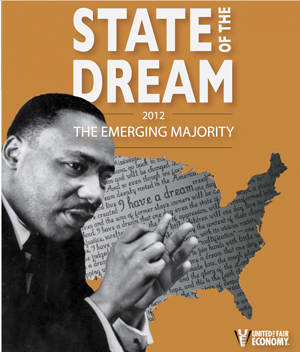By Charlene Muhammad CHARLENEM

(FinalCall.com) – People of color will be the majority of America’s population by 2042. They will also remain the least wealthy, least employed, least educated, and the most incarcerated, unless the country steps up efforts to close its racial economic divide, according to a new report by United for a Fair Economy.
“State of the Dream 2012: The Emerging Majority” is the Boston-based economic think tank’s ninth annual assessment of progress on Dr. Martin Luther King, Jr.’s vision of justice and equality since his assassination.
The 2012 report measured 30 years of public policy on the racial divide and its impact on economics, poverty, education, homeownership, health care, and incarceration. The outlook was bleak.
“I keep asking myself, ‘Why is everyone marching out in the streets? I think this is not good enough for America. Forty years after Dr. King died and we’re still where he was, fighting about the disparities in income, wealth, education, and incarceration,” said Wanjiku Mwangi, Racial Wealth Divide Initiative leader for United for a Fair Economy and report co-author.
The report forecasts poverty rates for Blacks will be 1.9 times higher than for Whites, and for Latinos, 2.6 times higher. Black and Latino unemployment rates will be 1.8 and 1.5 times higher than White unemployment rates, respectively, it continues.
“The main thing that struck me was how for the last 10 years, even pre-recession, how income and wealth equality was declining for disenfranchised minorities and poverty was increasing. If this continues into mid-21st century then, racial disparities will be even worse than projected by 2042,” said Dedrick Muhammad, NAACP senior director of the Economic Department and executive director of the Financial Freedom Center. He formerly worked for United for a Fair Economy and contributed to the report.
Authors cited education as one of the most important tools people have for climbing social and economic ladders, but disparities perpetuate inequality. Any gains made during the civil rights era are threatened by restrictions on affirmative action in higher education, spiraling college costs and underfunding of education.
In addition, according to Ms. Mwangi, Blacks are six times more likely to be in prison than Whites and people of color make up over 65 percent of the prison population and five million Blacks will be imprisoned in 2042 if things continue.
She feels that while America has made some progress, a great lack remains because people have ignored the institutions, programs, and structural practices that have historically kept people of color down. The treatment of Blacks during Hurricane Katrina in 2005 is one example, she continued.
“The official response to that disaster makes you think about how little things tend to affect what we do, think, and how our institutions operate … And carry forward back and look at all institutions in education and unemployment. Those things are still perpetuated,” Ms. Mwangi said.
She believes there’s hope if America invests in infrastructure, jobs, and education. Without education, there’s no income and without income there’s poverty and no food. People are jailed and cycles continue, so the solutions are for the good of everyone, not just Blacks and people of color, she added.
The answer to the crisis facing Black America is it must do for self, guides the Honorable Minister Louis Farrakhan. A first step is to pool money in a national treasury to buy farmland and rebuild wasted cities, he said during a January 9 interview with Cliff Kelley on WVON-AM 1690.
“Obama cannot make jobs for all of us who are unemployed, but we can,” Min. Farrakhan said, continuing that donations to a national fund of as little as one nickel-a-day to $1-a-month would yield $480 million in one year.
Blacks will need every cent of that amount to survive the future, if the report’s predictions manifest.
As disenfranchised minorities become a larger proportion of the population, their inclination to support more progressive policy will advance policies most helpful to rebuild a middle class economy, according to Mr. Muhammad.
“Yet as money becomes more and more of a determining factor in politics and barriers to voting become more and more common, the democratic voice of minorities will probably be weakened,” Mr. Muhammad said.
Report recommendations include stemming the foreclosure crisis by offering loan modification programs, increasing federal funding for higher education, and ending the war on drugs to substantially impact the racial economic divide due in upcoming decades and begin realizing Dr. King’s dream.
Each year the organization releases its State of the Dream report on or around Jan. 15. The date is referred to as “King Day” and commemorates the civil rights leader’s birthday. Tragically, many disparities he fought and sacrificed his life for still plague people of color, Ms. Mwangi said.
“We have a nation that has a history of racial inequality and White supremacy, all the things that have been put in place 50 years ago, 100 years ago, are still together, intact. If you break down all those institutional structures and start looking at things in a different way, we’ll continue talking about disparities because we’re not fighting the real thing,” Ms. Mwangi said.












